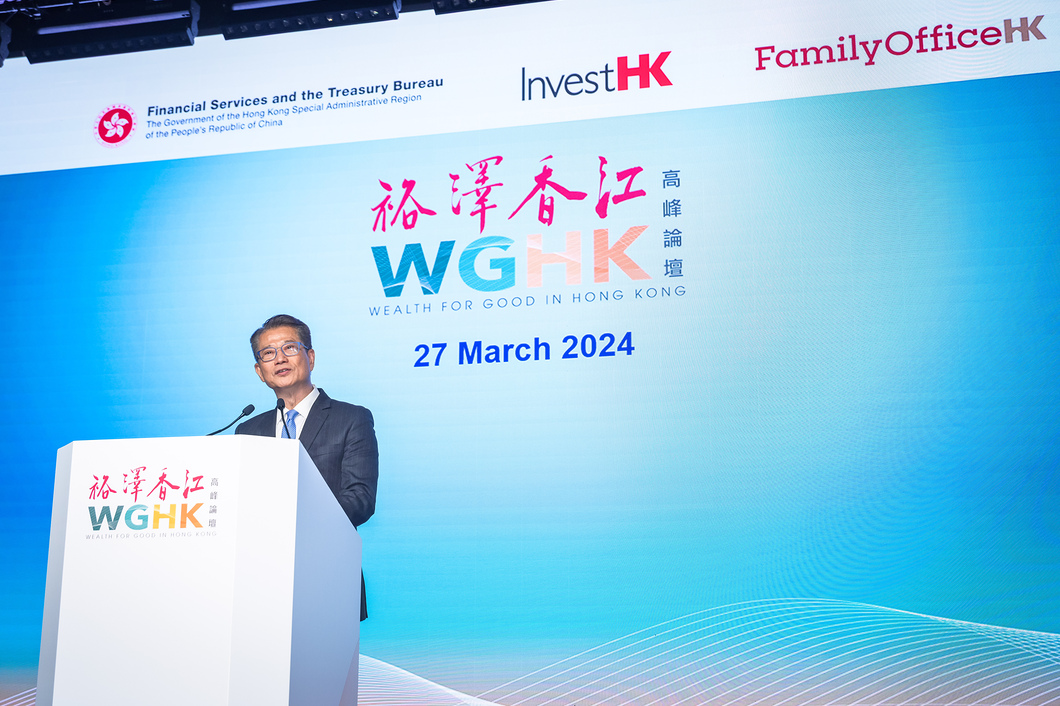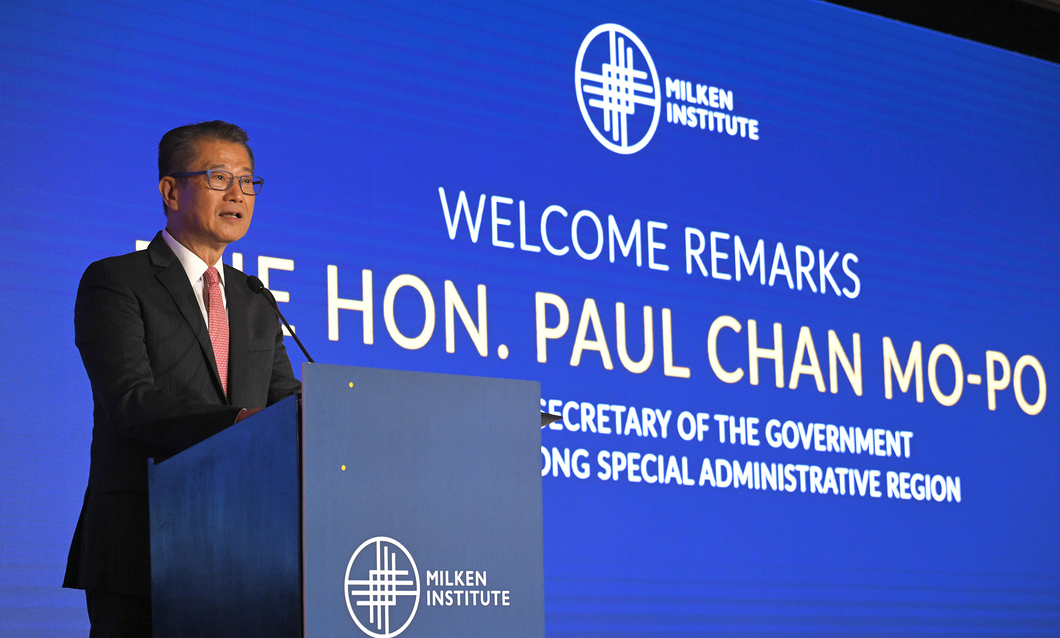Blog
Supporting Small and Medium Enterprises
The long Easter weekend has come. To celebrate, many of our residents have planned activities of various kinds. Some are travelling outside Hong Kong, while some others are staying in the city to relax and enjoy their holiday by dining out, going to the countryside and strolling around with family and friends.
After the long weekend holiday, we will enter the second quarter of 2024. Looking back at the first quarter, the overall Hong Kong economy maintained stable growth. Unemployment rate was below 3%; inflation was generally moderate; visitor arrivals exceeded 11 million. Such macroeconomic trends provided some support to the local retail, catering and transportation sectors. However, these sectors were also affected by changes in the consumption patterns of inbound visitors as well as some Hong Kong people going north more frequently to spend. These have weakened these sectors’ confidence in the outlook. Shops or restaurants located in different districts or targeting different customer groups experienced varying degrees of business recovery. It can be said that the local economic growth still requires consolidation. Rapid changes in consumption patterns and market trends have presented quite a number of challenges for the operations of some local small and medium enterprises (SMEs).

|
| Last week, I attended and spoke at the Wealth for Good in Hong Kong Summit Gala Dinner held during the Financial Mega Event Week. |
In view of the above, we have proposed a number of measures in the Budget with a view to alleviating the pressure on SMEs and creating more business opportunities for them through a multi-pronged strategy. Such measures include assisting them in dealing with cash flow needs, opening up new markets and engaging in digital transformation.
As regards addressing the cash flow needs, we have extended the application period for the 80% and 90% Guarantee Products under the SME Financing Guarantee Scheme (SFGS) for two years till the end of March 2026. The total loan guarantee commitment of the SFGS has also increased by $10 billion.
I have also instructed the Hong Kong Monetary Authority (HKMA) to maintain communication with banks and the business community to ensure that banks can assist enterprises with their funding needs in a more accommodating manner. Recently, HKMA convened the Banking Sector SME Lending Coordination Mechanism meeting again, with representatives from several banks involved in SME lending business. After considering views from different stakeholders, it announced nine measures last Thursday to support the financing needs of SMEs and help them sustain their operations and development amid a complex and changing business environment. These measures include, among others: not demanding early repayment from mortgage customers who repay on schedule, even if the value of the collateral declines; not adjusting the credit limit solely based on changes in the value of the collateral, and providing a minimum transition period of 6 months in the case of adjusting the credit limit. These measures help avoid unnecessary pressure on the funding chain of SMEs, or even trigger of chain reaction, due to any over-sensitive actions during short-term fluctuations in asset markets.

|
| Last week, I attended and spoke at the Milken Institute’s inaugural Global Investors’ Symposium held during the Financial Mega Event Week. |
In addition, the measures also include expediting the handling of applications for the 80% and 90% Guarantee Products under SFGS; providing more flexibility in the repayment of principal under the Principal Payment Holiday Scheme to pragmatically assist SMEs with their operational and funding needs. Moreover, we are actively exploring the provision of credit products and other support services that can better serve the needs of SMEs, including expediting the approval process for unsecured loans.
Regarding the arrangement of the Principal Payment Holiday Scheme, banks will adopt a sympathetic approach to provide loans to SMEs that still face difficulties, in accordance with prudent risk-management principles. That includes restructuring of relevant loans. As for enterprises that have transitioned to partial repayment of principal under the Scheme, banks will consider customer requests to extend the duration of partial principal repayment, allow customers to choose a lower proportion of partial principal repayment, or even offer principal moratorium. The above arrangements also apply to taxi loans, public light bus loans and commercial vehicle loans taken out by personal customers.
In recent years, we have been actively promoting Fintech development so as to meet the financing needs of SMEs in a more efficient and effective manner while properly managing risks. For instance, we encourage the banking industry to make greater use of the Commercial Data Interchange launched by HKMA. By reviewing various business data that SMEs agree to share, banks can provide bespoke credit products for SMEs, as well as other services to support their business development. Examples include cross-boundary banking services, digital business services, e-commerce-related services, etc., to assist SMEs in their business expansion, upgrade and transformation.
To facilitate SMEs in obtaining loans with better terms, HKMA will establish a one-stop platform to provide information on banking services for SMEs. This will enable them to compare and choose the products and services offered by banks. Banks participating in the coordination mechanism have also undertaken to provide assistance to SMEs that intend to switch banks for their loans.
Last week, I visited Art Basel and talked to representatives of participating art galleries as well as local, Mainland and overseas visitors.
Apart from assisting SMEs with their cash flow needs, it is equally important to gather more people and spending power to create more business opportunities and sales for enterprises. In the past week, the “Financial Mega Event Week” became a hotspot, with three major financial events held along with a series of accompanying business luncheons and dinners as well as seminars. These events had successfully brought together over 1,000 global political and business leaders, high-net-worth individuals, asset owners and representatives of multinational financial institutions. The occasion allowed them to personally experience the vibrancy of Hong Kong and our development opportunities. Their extensive business and interpersonal networks would also stimulate the coming of more high-value visitors to Hong Kong.
At the same time, this month is also Hong Kong’s “Art March”, with a number of important arts and cultural activities being held in Hong Kong. Last week alone, in addition to “Art@Harbour 2024” and the “Hong Kong International Cultural Summit 2024” organised by the Government, there were also a number of large-scale regional arts and cultural events, including the pop culture mega event “ComplexCon Hong Kong 2024”, which moved to Asia and was held in Hong Kong for the first time; as well as Art Basel and Art Central which focused on visual and modern arts. These events, having attracted tens of thousands of residents and tourists, had created a more vibrant atmosphere for the city.

|
| Last week, I visited Art Basel and talked to representatives of participating art galleries as well as local, Mainland and overseas visitors. |

|
| Last week, I visited Art Basel and talked to representatives of participating art galleries as well as local, Mainland and overseas visitors. |

|
| Last week, I visited Art Basel and talked to representatives of participating art galleries as well as local, Mainland and overseas visitors. |
I visited Art Basel last week. The exhibition brought together more than 240 internationally renowned art galleries from 40 countries and regions. The five-day event attracted more than 80 000 visitors. When I communicated with the exhibitors, I learned that the sales of artworks during the exhibition were quite good. This illustrates Hong Kong’s unique advantages in the exhibition, sale, storage and appreciation of artworks in Asia. Our unique advantages are also one of the main reasons why Art Basel has been using Hong Kong as a base to access the entire Asian art market since it first landed in Hong Kong in 2013. In fact, in 2023, the value of Hong Kong’s total import and export of artworks and antiques exceeded US$13.5 billion, accounting for around 1.2% of Hong Kong’s total trade value. We are the centre for art trading and auctions in the region.
Financial and art mega events are conducive to attracting more business activities and tourist spending. Every 1.5 million visitors are estimated to bring about $3 billion of value added to Hong Kong, and they can also create a positive environment and an upbeat atmosphere for various industries.
Hong Kong is a free, open, diverse and inclusive society, as well as a cultural melting pot of East and West. The city also has extensive international ties, a safe and stable social environment, as well as a vibrant cosmopolitan lifestyle – together with a beautiful Victoria Harbour and countryside. These qualities have given us a real edge in attracting visitors as well as art and culture lovers from across the globe. As we press ahead with the development of Hong Kong into an East-meets-West centre for international cultural exchange, this will inject energy to the development of our retail and catering sectors as well as the economy as a whole.
March 31, 2024